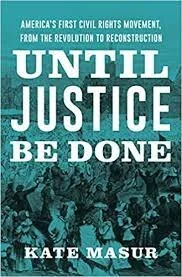REVIEW: Looking Back on America's First Civil Rights Movement
/Until Justice Be Done: America’s First Civil Rights Movement from the Revolution to Reconstruction by Kate Masur (W.W. Norton)
By Jim Swearingen
A torturous contradiction snakes through this nation’s constitutional history stretching back to the Founders and their nascent compromise loaded onto the backs of African slaves. Northwestern University history professor Kate Masur’s new book, Until Justice Be Done, chronicles the first attempts to dismantle that Faustian bargain. Before there were such commonplace terms, civil rights activists, Black and White, waged a decades-long, antebellum legislative and judicial campaign against the predatory inequality that lay cloaked in legal precedent since the Founding.
Long before the vaunted Civil Rights Movement and Civil Rights Acts of the 1960’s, long before Selma and Montgomery and Martin and Malcolm, before even the Civil War, citizens launched legal challenges to American White supremacy embedded in the state constitutions of the newly admitted states of the Northwest Territories.
“Black laws,” the legal precursors to Jim Crow, across the young nation variously preventing Blacks from voting, testifying against white defendants or serving on juries, accessing free public education, even from entering a town without registering. A few legislatures passed laws prohibiting Blacks from entering their states at all. The prohibition on Black plaintiffs’ testimony against White defendants, in particular, served as an open invitation for unscrupulous Whites to steal Black property, hector Black neighbors, and rape Black women with impunity.
Masur shows that the assumption of Black nuisance extends back to the early days of the Republic. When Missouri submitted its state constitution to Congress for approval in 1820, embedded in it was the characterization of free Blacks as undesirables. Its ban on their entry into the state assumed Black guilt without anything resembling modern due process. Enforcing Black subjugation fell within the domain of the states’ “police powers,” a brutal irony that links the enforcement of Black laws in the 1800’s to the uniformed murder of unarmed Black men in the 2000’s.
Masur further deconstructs the diabolical pattern of White supremacy’s Catch-22 which makes earning a stable living so daunting for Black Americans as to perpetuate myths of their criminality, sloth, and poverty. Blacks were often deprived of the very liberty and security that would enable them to belie such prejudices.
She also documents the prevalent danger to freed Blacks of being harvested for sale, kidnapped by slavers and hauled off down South to suffer a fate like Solomon Northrup of 12 Years a Slave. Simultaneously, Black ship captains and seamen arriving in southern ports were routinely imprisoned when their ships docked, either to prevent their influencing the minds of local slaves or to poach as slaves themselves on the trumped-up charge of being runaways.
At the time, the major legal weapon in attacking White separatism in America rested in the privileges and immunities clause (Article IV, Section 2) of the United States Constitution, which required that citizens of any state be treated as such in all the other states. Once select Northern states designated freed men as citizens, those same men could not be unduly detained or enslaved elsewhere in the U.S. That legal paradox lay at the core of legal challenges to racial discrimination throughout the pre-Civil War era.
Masur is another in a valiant legion of historians who continue to fill in gaps in our knowledge of the ancestry of American fascism from southern slave-owners to present-day insurrectionists, the defiant Know-Nothings who have never held allegiance to democratic principles when they challenged racial hegemony. Her work also reminds us that America has always garnered more loyalty from Black Americans, pushing the nation to fulfill its egalitarian promises, than the nation has shown them in return. That yin and yang of our schizophrenic political system continues to play out in a tension that we seem far from resolving.
During the George Floyd family press conference following the Chauvin conviction trifecta, Rev. Al Sharpton admonished the audience to remember those in the struggle for equality who had come before: “The movement didn’t start with us. We are a continuation of movements before us and they will continue until [we attain] freedom.” Kate Masur has captured many of those initial legal battles for the soul of this nation. When America finally does realize Martin Luther King’s “mighty stream” of justice, it will stretch all the way back to the headwaters of the Republic.
Jim Swearingen is a Minneapolis-based writer.










